Volunteering with refugees as a student: The Highs and Lows
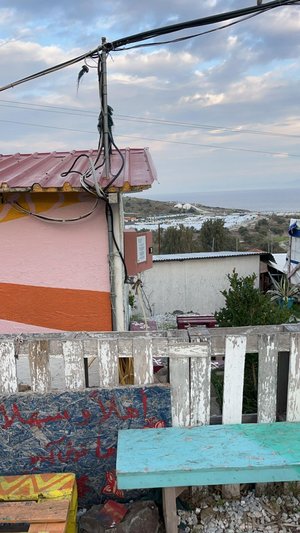
During my time at Oxford, I have spent much of my free time trying to combat gender-based discrimination and harassment. I have also volunteered with refugees in Greece. I have known since the beginning of my degree that I wanted to work within the not-for-profit sector, specifically to help women obtain an education and reduce period poverty. However, there are few volunteering opportunities available between terms. When searching for opportunities, I stumbled upon an organisation called Indigo Volunteers, which partners NGOs with volunteers based on their skill set.
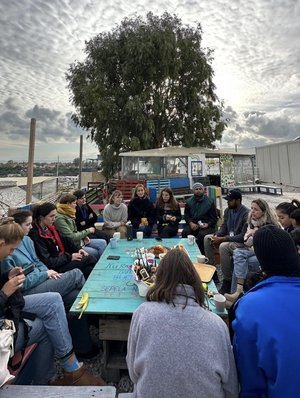
Within a week, I had partnered with an NGO in Lesvos, Greece. For five weeks of the summer vacation last year, I volunteered at Paréa, a community centre on Lesvos, and a short walk from one of the largest refugee camps in Europe. In Paréa, ten different NGOs work together to provide basic facilities and resources to refugees and asylum seekers. I ended up volunteering with Europe Cares, a German NGO, controls the vast majority of the spaces.
I worked in several spaces such as the café, the Women's only space, food and lunch distribution, and the Paréa Club. Outside these spaces are English, Computer, Photography and Legal skill classes, laundry facilities, a free shop for hygiene products, a garden growing fresh produce that can be taken by whoever wants it, and a repair shop. Therefore, it is a place with many different things happening every day and is somewhere without which the lives of those in the camp would be unimaginable. There are other NGOs based outside Paréa too, but many of them are only open to women and children, so the vast majority of our visitors were young men, mostly from Afghanistan, Palestine, and East Africa.
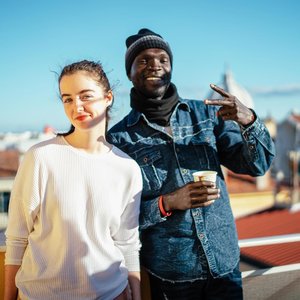
On an average day, the community centre serves around 400 visitors from the refugee camp, but we have had upwards of 800 in the past. Although this is a huge number, most days, it would be the same visitors coming, and I quickly became incredibly close to many. In particular, I would spend most days chatting with a group of Palestinian guys and even met up with them on New Year's Eve in Athens! Each day we would have different activities and would often be playing volleyball, guitar or uno as a way to get to know each other, and give people something that is not being provided by the camp. Although the situation is horrific, Paréa itself is a place full of joy and love that cannot be explained without being there.
When I left on the thirteen-hour-long journey back to the East Midlands, I was filled with sadness, not just because of the situation of the refugees, but because I genuinely felt I had found somewhere that I belonged. It's a strange feeling to feel like you belong somewhere you wish didn't need to exist, and somewhere that everyone else hopes to be able to leave within a matter of weeks. But this is a feeling shared by all those who leave, including many refugees, because it was a place of humanity and compassion that seems to be depleting outside these hubs. I remember on my first day that another volunteer was crying, because a large group was being transferred to a camp outside of Athens to continue their asylum process. It is a confusing situation because they had to go to mainland Greece to get their documents, and so you are thrilled for them in that regard, but it was a well-known fact that the conditions in the Athens camp were even worse than in Lesvos, because there were so few NGOs there to provide activities and fulfil basic needs.
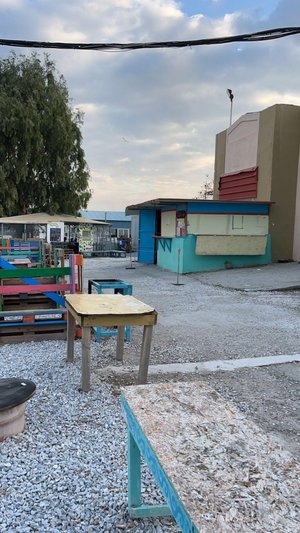
I think it is no surprise that in December 2024, I returned to Paréa for four weeks. Returning in the winter, when the beach trips of the summer were no longer an option, was definitely a different environment. For starters, I was by far the youngest in the group, being 20 at the time, and most other volunteers were social workers or postgraduates. My previous group over the summer, by contrast, was almost unanimously students with a couple of free months and minimal responsibilities. The vast majority of the visitors to the centre I knew from my earlier visit had since been transferred to Athens. Of course, you don't want people to get trapped on Lesvos. For those few people remaining that I knew, there was a great feeling of guilt because I had been able to leave and continue with my studies and see my family, whilst they remained stuck in a state of limbo because of their nationality and legal status. And yet, out of human nature, you become immediately at ease when you recognise people you know, even though you wish they could have moved on. I was thrilled to hear that one of our refugees, a community volunteer in Paréa, who had been in Lesvos since April 2023, was given his papers and passport in January and could continue with his life.
Still, simultaneously, I know people who have been stuck on Lesvos for over four years because they cannot go back to their home countries, and continuing onwards through unsafe routes will likely result in being trapped again in a different location. For those people from Afghanistan, Somalia, Syria, Pakistan, and Bangladesh, this is far more common since they are required to do an additional interview about why Turkey is not a safe country for them – an interview that a very low proportion of people pass. If they are then given a negative decision. and cannot obtain food from the camp or get a job, and as such they become reliant on NGOs for basic survival.
In many ways, the joy I had felt towards Paréa was stripped away when I returned in December because it was clear that the situation of the refugees was worsening. The cost of running the centre meant we had to fundraise over £40,000 to keep everything functioning. Over a 1000 people are currently unable to receive food within the refugee camp, an issue that cannot nor should be solved by NGOs, and the hygiene facilities continue to worsen as the population grows. Without the Paréa community centre, it is incomprehensible just how much more inhumane the situation could become – and yet, because the conditions are only worsening, the financial and emotional costs of running spaces like Paréa are ever increasing.
When I left Paréa again on the 10th of January this year to start term on the 11th, there weren't any long goodbyes as when I first left in September; instead, it was clear I would somehow see everyone again. I am now helping out as a Communications Volunteer for Europe Cares, and I produce content for their Instagram as part of a wider team. I recently attended the United Against Inhumanity campaign launch on Europe Cares' behalf and am getting to understand just what is required to run a facility like Paréa. We have just celebrated the second year of Paréa, and it is an all-hands-on-deck period as we continue to need to increase funds.
Paréa means ‘community’ or ‘circle of friends’ in Greek, which is precisely what the community centre is. It is a place where everyone comes together, cares for one another, and feels genuine love and respect for each other's needs. It is a community that continues to exist across Europe as people move. I hope to see change over time so that no one is ever as reliant on places like Paréa for their survival as they currently are and that these legalised forms of inhumanity and cruelty are undone. I don't know which path I will follow as I approach the end of my time at Oxford, if I will continue to work with refugees or return to my previous plan of tackling gender-based discrimination – although there is substantial overlap, but I do know that it will be several years before I feel that my time with Paréa is done.
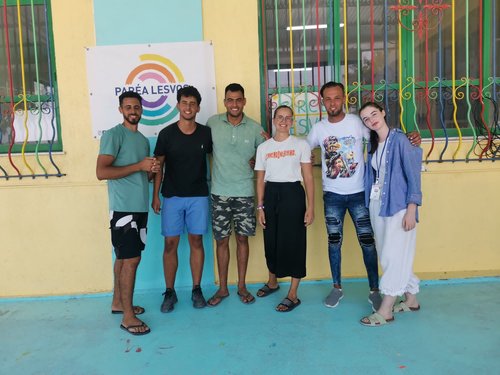
Check for updates on the Women's Network Facebook Page